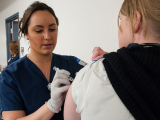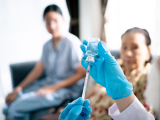Jun 17, 2008 (CIDRAP News) – Australian authorities have approved an H5N1 avian influenza vaccine made by the Australian-based pharmaceutical company CSL Limited, giving the country a home-grown defensive tool if the virus evolves into a pandemic strain.
Meanwhile, Swiss-based Novartis has withdrawn its application for a European license for its own H5N1 vaccine, saying it couldn't meet a deadline to supply additional clinical data requested by regulators, the European Medicines Agency (EMEA) announced yesterday.
CSL announced today the approval of its vaccine, Panvax, by Australia's Therapeutic Goods Administration. The Australian government had provided more than $7 million to help develop the vaccine, according to a report from the Courier Mail, a Brisbane newspaper.
Panvax can be used only when the Australian government officially declares that a flu pandemic is under way, CSL said in a news release.
"In the event of a pandemic, CSL will rapidly gear up to manufacturing levels that will ensure all Australians have access to safe, effective coverage against avian flu," said Mary Sontrop, general manager of CSL Biotherapies, in the news release.
The release quoted Australian Health Minister Nicola Roxon as saying, "This places Australia in an excellent position in terms of its preparedness to manage an avian flu pandemic should one arise and should reassure all Australians."
Other H5N1 vaccines that have been licensed so far include a GlaxoSmithKline product that was approved by the European Union in May and a Sanofi Pasteur vaccine that was endorsed by the US Food and Drug Administration in April 2007. The US government is stockpiling Sanofi's vaccine.
CSL said the immunogenicity and safety of Panvax have been tested in three clinical trials, involving adults aged 18 to 64 and adults older than 64. The vaccine, given in two doses, was found to be safe and well tolerated.
The CSL statement listed no details about the composition of the vaccine. But a chart of clinical trials on the Web site of the International Federation of Pharmaceutical Manufacturers and Associations says it is a split-virus vaccine that is produced in eggs and is used with an adjuvant. Experts say that with egg-based production, it will take 4 to 6 months after the identification of a pandemic flu strain to develop and launch mass production of a precisely matched vaccine.
Roxon said Australia already has 1.2 million doses of a foreign-made vaccine on hand, according to the Courier Mail report.
Novartis withdrawal
The EMEA said Novartis withdrew its application for licensing of Aflunov because it could not meet a deadline for supplying more clinical data requested by the agency's Committee for Medicinal Products for Human Use (CHMP).
"The CHMP had requested additional data because a good clinical practice (GCP) inspection showed that the main study had not been conducted in compliance with GCP, so that its results could not be considered reliable for use in the evaluation of the vaccine," the EMEA statement said.
Novartis had submitted its application in November 2006. The EMEA said withdrawal of the application does not preclude a reapplication later.
See also:
Jun 17 CSL news release
http://www.csl.com.au/s1/cs/auhq/1196562650160/news/1211307236036/prdetail.htm



















